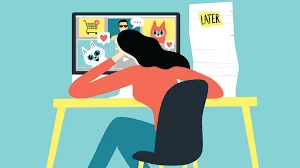How to avoid procrastination effectively
For their study published in Economic Inquiry, Professor Stephen Knowles of the Otago Business School's Department of Economics and his co-authors tested the effect of deadline length on task completion.
Participants were invited to complete an online survey in exchange for a charitable contribution. They had one week, one month, or no deadline, depending on their response, to respond.
Professor Knowles says the research began because he and his colleagues – Dr Murat Genç from the Department of Economics at Otago, Dr Trudy Sullivan from the Department of Preventive and Social Medicine at Otago, and Professor Maro Servátka from the Macquarie Graduate School of Management – wanted to help charities raise more money.

How to avoid procrastination effectively
However, the results are applicable to any situation in which someone requests assistance from another person. Professor Knowles explains that this could involve requesting assistance from a coworker or your partner. According to the study, responses to the survey were lowest when the deadline was one month and highest when no deadline was specified. The lack of a deadline and the one-week deadline resulted in many early responses, whereas a long deadline appeared to allow people to procrastinate and then forget.

Participants had one week, one month, or no deadline, to respond the survey.
Professor Knowles was unsurprised to discover that a shorter deadline increased the likelihood of receiving a response in comparison to a longer deadline. However, he found it intriguing that they received the most responses when there was no deadline. This, he says, "We interpret this as evidence that specifying a longer deadline, as opposed to a short deadline or no deadline at all, removes the urgency to act, which is often perceived by people when asked to help," "People therefore put off undertaking the task, and since they are inattentive or forget, postponing it results in lower response rates."
He believes that not specifying a deadline may have led participants to believe that there is an implicit deadline. Professor Knowles hopes that his research will aid in the reduction of procrastination. Many people procrastinate. They have the best intentions of helping someone out, but just do not get around to doing it."
Journal Reference: Stephen Knowles, Maroš Servátka, Trudy Sullivan, Murat Genç. Procrastination and the non‐monotonic effect of deadlines on task completion. Economic Inquiry, 2021; DOI: 10.1111/ecin.13042
End of content
Không có tin nào tiếp theo



